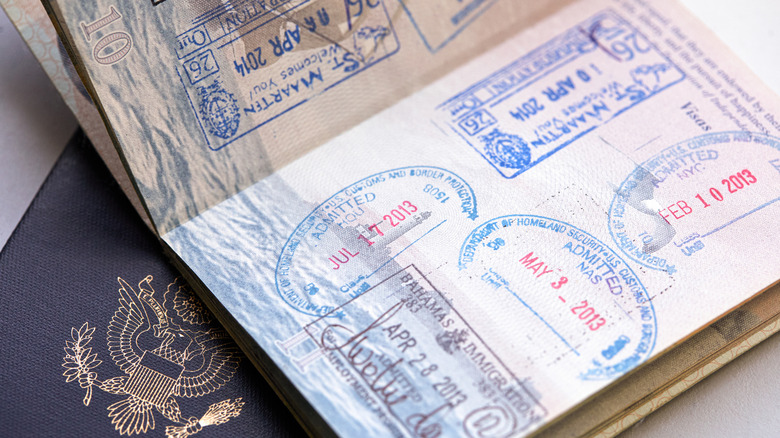Requirements Tourists Need To Know About Before Traveling To Japan
To plenty of travelers out there, Japan feels like the ultimate bucket list destination. Brimming with history, culture, and mouthwatering food, the country stands out as a place where tradition and modernity come together in harmony. From the bustling Harajuku District in Tokyo to the ancient temples of Kyoto, and the beaches of Okinawa, there's plenty of unmissable Japanese destinations calling out to be discovered.
That said, before you can start packing your bags and practicing your go-to sushi order, there are a few things you need to know — and need to bring — to even be allowed into the country. And we're not just talking about some extra cash for all that shopping you'll definitely be doing.
Depending on where you're from, Japan has a series of entry requirements that travelers must abide by — otherwise, they might risk refusal or deportation. This includes everything from holding a valid passport with at least one empty page to securing proof of onward travel, having confirmed accommodation and hotel bookings, and (in some cases) obtaining a valid visa depending on the nature of their visit. Along with that, the Asian nation also has some pretty strict rules regarding restricted items — like certain medications and recreational drugs — which can easily cause serious problems if you're not careful.
U.S. travelers can visit Japan visa-free
One of the most important requirements for entering Japan is a valid passport with at least one blank page reserved for entry stamps. In terms of documentation, U.S. citizens can travel to and stay in Japan for up to 90 days without a visa.
That said, you do need to show proof of onward travel and sufficient funds to support your stay. While passing through Japan's immigration checkpoints, all travelers are also required to provide fingerprint scans and photos, with some exceptions for diplomatic visa holders and minors.
In line with this, it's worth mentioning that Japan's visa-free entry for Americans only covers tourism. Travelers are not allowed, under any circumstances, to work during their stay — including things like bartending, teaching English, and other forms of remote work or digital nomad activities. If you do plan to work in Japan, even temporarily, you must secure the appropriate permit — like the country's recently-launched digital nomad visa, for example — through Japanese authorities before your trip.
Other considerations to keep in mind
Along with visa requirements, foreign travelers must keep their passport with them at all times during their stay — it's a legal requirement in Japan, and local police may ask to check your identification. Worried about carrying it around? Although rare, if anything happens to your passport during your stay (say, it gets stolen or lost during a day out), the U.S. Embassy in Japan is equipped to help you replace your document without too much hassle.
Lastly, as a precaution, it's important to mention that Japan — similarly to its neighbors — upholds some pretty strict rules regarding medications that might catch unsuspecting travelers off-guard. For starters, many common U.S. prescriptions and over-the-counter drugs are actually illegal in Japan — even with a valid prescription.
These include commonly used medications that contain pseudoephedrine or codeine, as well as ADHD medications containing stimulants, any form of CBD oil, certain allergy medications, and antidepressants. Before you travel, make sure to contact Japan's Ministry of Health, Labor, and Welfare to confirm whether or not you're allowed to bring any specific medications on your trip, and ask about any other documentation you might need before your arrival (like a "Yunyu Kakunin-sho" or import certificate). After all, you definitely don't want land yourself in hot water with local authorities — especially if it's before your holiday's even started.


